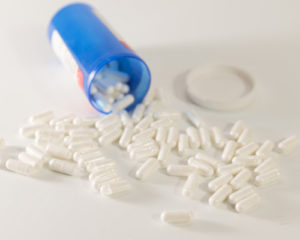Ambien is a sedative medication prescribed to treat insomnia. It can be dangerous to combine it with alcohol.
Mixing drugs with a similar mechanism of action can result in an enhancement of their potentially dangerous effects, such as sedation, judgment problems, and the potential for overdose.
What is Ambien?
Ambien (zolpidem) is a prescription sedative. It is most often used to help people fall asleep. Since it has a short onset of action and remains in the body for a short time, it is less effective at helping people maintain sleep.
Ambien is a controlled substance, classified in the C IV category by the U.S. Drug Enforcement Administration (DEA). This means that anyone who possesses Ambien should have a prescription for it.
Although Ambien works on the same neurotransmitter systems as the more potent benzodiazepines, it is not classified in the same category as benzodiazepines or other powerful tranquilizers.
Ambien Abuse
Drugs with sedative effects like benzodiazepines and prescription pain medications like opioids are often abused. They are often abused in conjunction with other drugs, particularly alcohol.
According to the Substance Abuse and Mental Health Services Administration (SAMHSA):
Ambien Abuse Statistics
- It was estimated that 11.5 million individuals used a product containing zolpidem in 2016. In 2017, this estimation was 9.5 million people.
- It was estimated that 1 million individuals misused a product containing zolpidem in 2016. In 2017, this estimate was 901,000.
- Of the drugs classified as mild sedatives, zolpidem products appear to have the highest rates of use and misuse.
- Misuse of a drug is not the same thing as drug abuse. SAMHSA defines misuse as taking the drug, for a reason, that is not consistent with its medicinal purpose. Abuse of the drug is a chronic pattern of misuse, and drug abuse is typically diagnosed by a mental health professional.
Alcohol + Ambien = A Dangerous Combination
Ambien, like nearly every prescription medication, is not designed to be used with alcohol. The warnings on prescription bottles of Ambien will specifically state not to use it with alcohol.
If you use mbien and alcohol together, you are engaging in a severe misuse of both drugs that can have serious ramifications.
All medications have a side effect profile, and the most common side effects associated with Ambien are dizziness, lightheadedness, coordination problems, headache, nausea, diarrhea, and difficulties with lethargy or sedation. Using Ambien in conjunction with alcohol use will increase the risk that you will experience any of these side effects. They will often be more intense than the side effects that occur as a result of using Ambien by itself.

Rarer Side Effects
Some people who use Ambien may develop more adverse side effects. Although they are rare, alcohol use increases the potential for these to develop. These include confusion, rashes on the skin, the development of depressive symptoms, hallucinations, and problems with urination that include blood in the urine.
Sedatives like Ambien may produce problems with memory in some people. When Ambien is combined with alcohol, the potential to experience blackouts (periods where one cannot remember what happened or what they did while under the influence) is increased.
An infrequent side effect associated with using Ambien is the experience of a parasomnia, which occurs when a person engages in behavior they would typically do while they are awake, but carry out this behavior while they are sleeping. The most common parasomnia is sleepwalking, but some individuals may perform more complex actions, such as driving a car while asleep. Most often, when the person wakes up, they have no memory of what they did. Using alcohol with Ambien may increase the potential for you to develop this rare side effect, which can have potentially dangerous results.
Other Potential Dangers
The primary problem that occurs when you mix alcohol and Ambien is that you enhance the effects of both substances.
Alcohol and Ambien are central nervous system depressants, and they inhibit the functioning of the neurons in the brain and spinal cord. Mixing them means that you get more powerful effects from either drug at lower doses.
The enhancement of the effects of combining alcohol and Ambien include:
- Increased lethargy and sedation that leads to numerous issues
- A sharp decline in automatic life-sustaining bodily functions, such as breathing rate, heart rate, and blood pressure
- Serious impairment in judgment that can lead to irrational behaviors
- A significant difficulty in controlling emotions or impulses that can result in serious problems
- Unpredictable or unusual reactions to Ambien or alcohol that would not occur if either drug was taken alon
- Increased potential to overdose on either drug. An overdose of either can be potentially fatal
Ambien Is Not Designed for Long-Term Use
People who take Ambien for more than a couple weeks may develop significant tolerance to the drug and may not benefit from its medicinal effects. Ambien is considered to be a short-term solution for problems with insomnia until you can be instructed in behavioral methods to help you sleep. It is not designed to be used over the long term.
If you regularly combine Ambien with alcohol, you will likely develop significant tolerance to the drug, and you may begin abusing higher amounts of Ambien, increasing the potential for detrimental effects. Through time, this can result in significant damage to organs like the liver and even the brain.
The longer you continue to abuse Ambien by mixing it with alcohol, the more likely you are to develop a significant substance use disorder that will require professional treatment.

